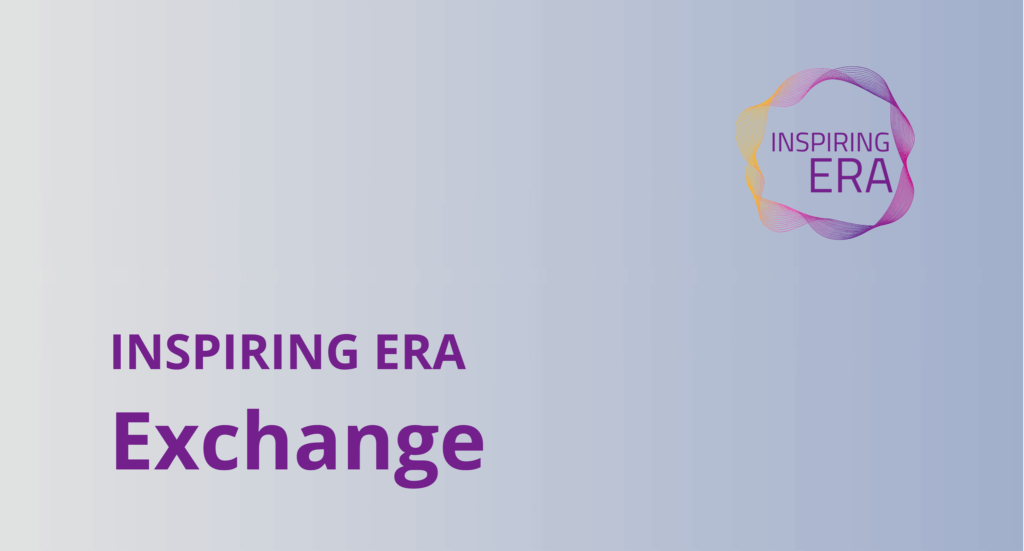Boosting Research Careers Across Europe: Insights from the INSPIRING ERA Exchange
Online, 13 November 2024 – Europe’s scientific excellence relies on its people — yet many researchers still face precarious employment, uncertain career paths, and barriers to moving between sectors. How can research careers become more sustainable and attractive across Europe? This question guided the INSPIRING ERA Exchange on ERA Action 4, an online event co-organised by INSPIRING ERA, the European Commission, and several leading organisations in research policy and higher education.
More than 200 participants from 30 countries — including researchers, policymakers, HR experts, and university representatives — joined to explore new European tools and frameworks shaping the future of research careers.
Setting the Scene: A Changing Policy Landscape
Opening the session, Manuel Aleixo, Head of Unit at the European Commission, underlined that Europe stands at a critical juncture: “We are in a moment of transition — with a new Parliament, a new College of Commissioners, and new challenges for the ERA. The question is how to turn this political momentum into better conditions for researchers.”
Dario Capezzuto (European Commission, DG R&I) mapped out the scale of the issue: with over two million researchers in Europe, the challenge is not only to create jobs but to ensure quality careers. He identified the main priorities — from improving recruitment and working conditions to reforming assessment systems and balancing talent circulation — all forming the backbone of ERA Action 4. “The goal,” he noted, “is to build a true single market for researchers, knowledge, and technology.”
From the Member State perspective, Luísa Henriques of Portugal’s FCT emphasised how the European Framework for Research Careers and the new European Charter for Researchers mark a decisive shift “from system-centred to researcher-centred policies.” Yet she also warned that recent debates risk shifting focus back to institutional needs, reminding participants that “competition for talent is a reality — and Europe must respond.”
European Tools for Career Development
Several flagship initiatives were presented as part of the EU’s “package for attractive and sustainable research careers”:
- ERA Talent Platform – Introduced by Slaven Misljencevic (DG R&I), this comprehensive digital hub integrates multiple tools and job portals, helping researchers navigate career opportunities and mobility schemes across Europe. It also builds on EURAXESS, which for over 20 years has provided practical guidance on employment, social security, and mobility.
- RESAVER Pension Scheme – A solution to one of the most persistent challenges in European research: pension portability. The scheme allows mobile researchers to maintain a single, transferable pension across borders — a key step toward financial stability for those pursuing international careers.
- ResearchComp Framework – Presented through case studies from Charles University in Prague, this competence framework helps researchers assess and develop the 38 skills across seven competence areas needed for career progression. It supports institutions in designing training programmes and bridges gaps between academia, industry, and the public sector.
- Research and Innovation Careers Observatory (ReICO) – Claudia Sarrico from the OECD highlighted this new observatory as a vital source of data on researchers’ career trajectories. By analysing employment trends and policy impacts, it aims to inform evidence-based decision-making at both EU and national levels.
- HR Excellence in Research Award – Representatives from University of Siegen and Repsol shared how this recognition has improved their recruitment processes, employee satisfaction, and institutional reputation. As Michele Rosa-Clot (European Commission) explained, the award ensures that “research organisations adhere to the highest standards of employment and integrity.”
Challenges on the Ground
Participants identified a number of structural barriers still limiting the sustainability and attractiveness of research careers in Europe:
- Precarious employment – Short-term contracts and uncertain funding make long-term career planning difficult, discouraging young researchers from staying in academia.
- Fragmented mobility systems – Administrative and financial obstacles continue to hinder smooth movement between countries and sectors.
- Outdated assessment methods – Traditional metrics like publication counts still dominate, slowing the transition to more comprehensive evaluation frameworks.
- Limited inter-sectoral pathways – Cooperation between academia, industry, and public institutions remains uneven, reducing opportunities for knowledge exchange.
- Financial insecurity – Inconsistent pension and social benefits penalise those who move internationally.
- Data gaps – A lack of comparable, long-term data on researcher careers hampers effective policy evaluation.
- Uneven implementation – While some countries are advancing, others lag behind in adopting the European Framework and related initiatives.
Pathways Forward
The discussions pointed toward several concrete steps to advance ERA Action 4 and ensure real progress across Europe:
- Adopt and implement the European Framework for Research Careers, harmonising standards across Member States.
- Integrate tools like ResearchComp and the ERA Talent Platform into doctoral and postdoctoral training, ensuring early-career researchers are equipped for diverse pathways.
- Strengthen financial stability through wider adoption of the RESAVER scheme and better national alignment of social security systems.
- Promote cross-sector mobility by recognising diverse career experiences and rewarding collaboration between academia, industry, and society.
- Invest in long-term data collection, building on ReICO to monitor trends and identify policy gaps.
- Foster institutional change by linking HR Excellence in Research to concrete improvements in recruitment, mentoring, and transparency.
- Maintain researcher-centric focus in future ERA Policy Agendas, ensuring reforms genuinely enhance individual opportunities rather than only institutional efficiency.
Why It Matters
The sustainability of research careers is not merely an employment issue — it is fundamental to Europe’s capacity for innovation, knowledge creation, and global competitiveness. As the event concluded, Emmanuelle Gardan of the Coimbra Group reminded participants: “If we want excellent science, we must ensure excellent careers. That means stability, recognition, and opportunity at every stage.”
By connecting policy ambition with practical tools and experiences, the INSPIRING ERA Exchange demonstrated how European collaboration can turn high-level frameworks into tangible improvements for researchers.
ERA Action 4 is not only about reforming policy; it is about ensuring that every researcher in Europe can build a sustainable, fulfilling, and impactful career.


